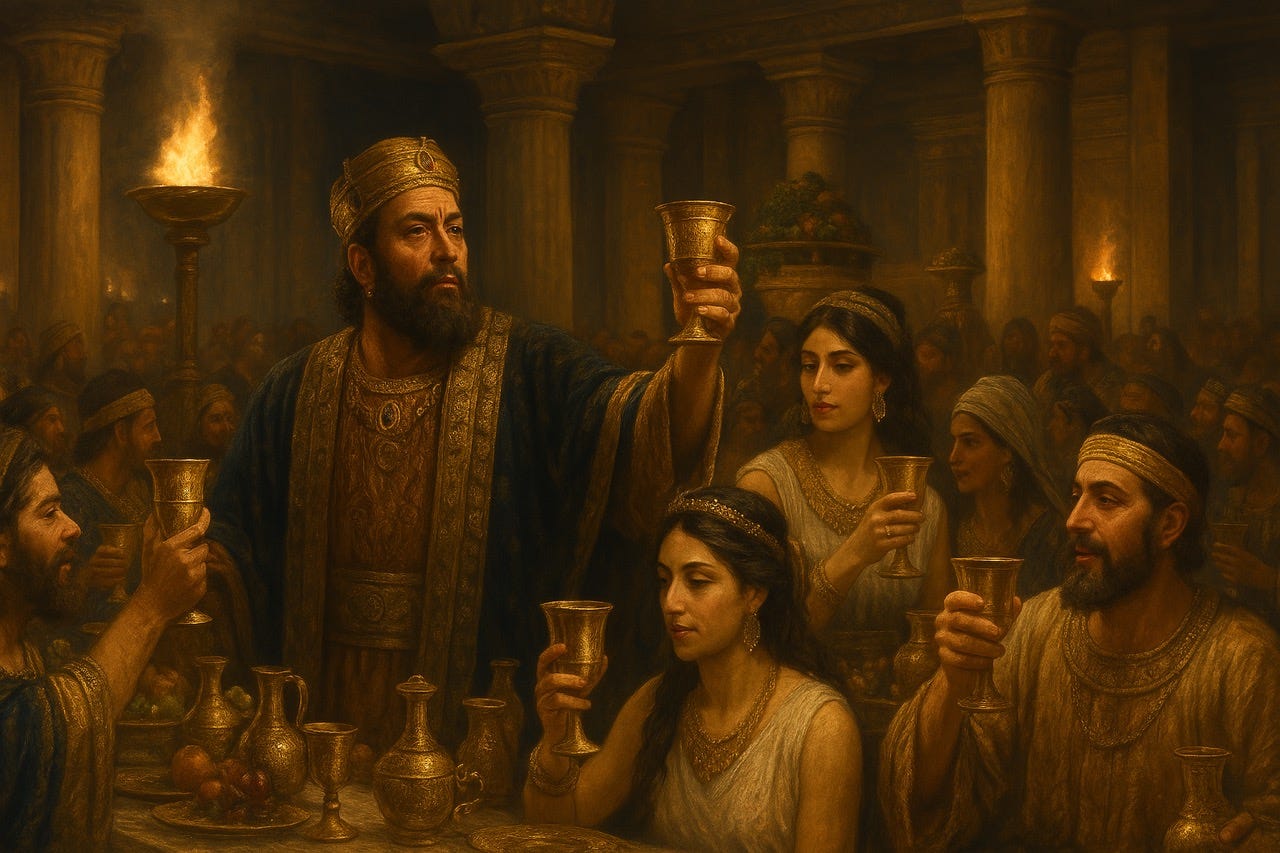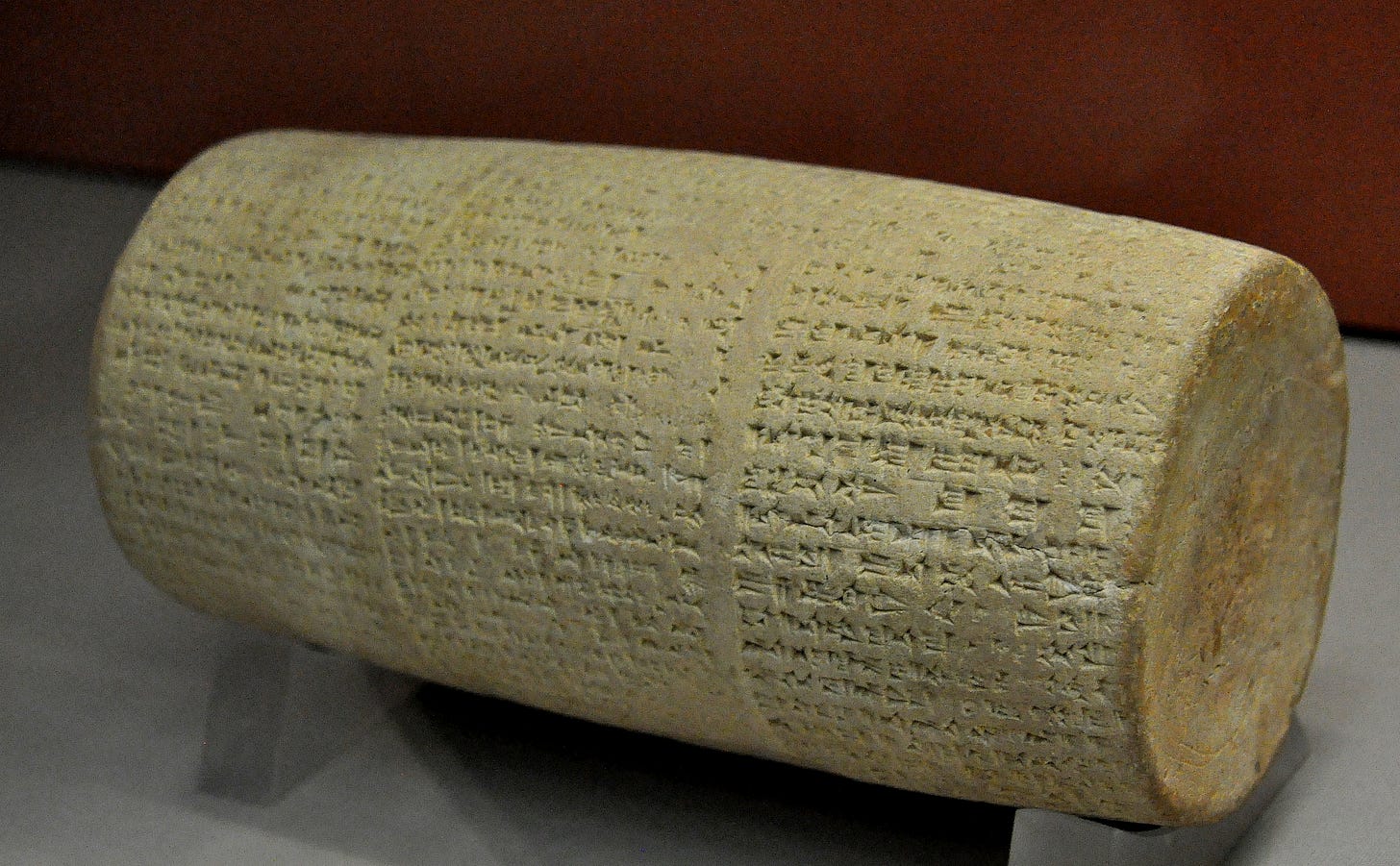Diving into Daniel: A New King and Handwriting on the Wall
Daniel 5:1-12 - God can communicate in many different ways with humans (dreams, visions, words on a wall).
“Belshazzar the king held a great feast for a thousand of his nobles, and he was drinking wine in the presence of the thousand. When Belshazzar tasted the wine, he gave orders to bring the gold and silver vessels which Nebuchadnezzar his father had taken out of the temple which was in Jerusalem, so that the king and his nobles, his wives and his concubines might drink from them. Then they brought the gold vessels that had been taken out of the temple, the house of God which was in Jerusalem; and the king and his nobles, his wives and his concubines drank from them. They drank the wine and praised the gods of gold and silver, of bronze, iron, wood and stone.
Suddenly the fingers of a man’s hand emerged and began writing opposite the lampstand on the plaster of the wall of the king’s palace, and the king saw the back of the hand that did the writing. Then the king’s face grew pale and his thoughts alarmed him, and his hip joints went slack and his knees began knocking together. The king called aloud to bring in the conjurers, the Chaldeans and the diviners. The king spoke and said to the wise men of Babylon, “Any man who can read this inscription and explain its interpretation to me shall be clothed with purple and have a necklace of gold around his neck, and have authority as third ruler in the kingdom.” Then all the king’s wise men came in, but they could not read the inscription or make known its interpretation to the king. Then King Belshazzar was greatly alarmed, his face grew even paler, and his nobles were perplexed.
The queen entered the banquet hall because of the words of the king and his nobles; the queen spoke and said, “O king, live forever! Do not let your thoughts alarm you or your face be pale. There is a man in your kingdom in whom is a spirit of the holy gods; and in the days of your father, illumination, insight and wisdom like the wisdom of the gods were found in him. And King Nebuchadnezzar, your father, your father the king, appointed him chief of the magicians, conjurers, Chaldeans and diviners. This was because an extraordinary spirit, knowledge and insight, interpretation of dreams, explanation of enigmas and solving of difficult problems were found in this Daniel, whom the king named Belteshazzar. Let Daniel now be summoned and he will declare the interpretation.””
Daniel 5:1-12 NASB1995
The Book of Daniel in Chapter 5 moves forward in time to approximately 539 B.C. This chapter is considered by liberal or skeptical commentators to be another “gotcha” concerning the authenticity of the book because allegedly a king named Belshazzar was not the last king of Babylon. However, this person and the sequence of events was verified by archaeological evidence discovered about 150 years ago. Here is a summary of the background of Belshazzar from Enduring Word:
a. Belshazzar the king: When we come to Daniel 5, Nebuchadnezzar is no longer the king of Babylon. How did it pass from Nebuchadnezzar to Belshazzar? The ancient historian Berosus gives us the following order of events:
· Nebuchadnezzar died after a 43-year reign.
· His son, Evil-Merodach (described in 2 Kings 25:27-30 and Jeremiah 52:31-34) ruled for only two years when he was assassinated by his brother-in-law Neriglassar, because his rule was arbitrary and licentious.
· Neriglassar (mentioned as Nergalsharezer in Jeremiah 39:3, 13) ruled for four years until he died a natural death.
· His son, Laborosoarchod, only a child and of diminished mental capacity, ruled for only nine months when he was beaten to death by a gang of conspirators.
· The conspirators appointed Nabonidus, one of their gang, to be king. He ruled until Cyrus the Persian conquered Babylon.
b. Belshazzar the king: For a long time, historians and archaeologists knew that Nabonidus was said to be the last king of Babylon, not Belshazzar (who was Nabonidus’ eldest son). The solution to this so-called discrepancy was apparent when evidence was uncovered indicating not only Belshazzar’s association with Nabonidus on the throne, but also demonstrating that during the last part of his reign Nabonidus lived in Arabia and left the conduct of the Kingdom of Babylon to his eldest son Belshazzar.
i. There was no additional mention of Belshazzar, the eldest son and co-regent with Nabonidus, until the Nabonidus Cylinder was discovered in this century [actually discovered in the 1850’s]. It is now displayed in the British Museum.
ii. According to Babylonian records, Belshazzar became co-regent in the third year of Nabonidus’ reign (553 B.C.) and continued in that capacity till the fall of Babylon (539 B.C.).
iii. It is most likely that at the time of Daniel 5, Nabonidus had gone out to fight the Medo-Persian army and had been already captured. Those armies now surrounded Babylon, and were looking for a way into the strongly defended city.
So archaeology once again proves the Bible to be true. Believers should be cautioned to always trust in God’s Word first and not use a back door into belief through the discoveries of science. Here is a photo of the Nabonidus Cylinder from Wikipedia (photo is licensed under a Creative Commons license - see footnotes):
Precept Austin cites the Apologetics Study Bible for sound rationale behind calling Nebuchadnezzar the father of Belshazzar:
“His predecessor" literally reads "his father" in the Aramaic text. Nebuchadnezzar is called Belshazzar's predecessor six times in this chapter (vv. 2,11,13,18), and the king is designated as the "successor" (literally, "son") of Nebuchadnezzar once (v. 22). Babylonian sources record that Belshazzar was the son of Nabonidus. The apparent discrepancy may be explained by the use of the terms predecessor (or father) and successor (or son) in the Semitic languages. "Predecessor" could refer to one's immediate father, grandfather, ancestor, or as in the case of kings, the immediate predecessor. Likewise "successor" may mean one's immediate offspring, grandson, descendant, or the immediate successor. An example of the latter is Jehu's designation as the "son of Omri" in the Black Obelisk of Shalmaneser III. It is likely that Nabonidus wed a daughter of Nebuchadnezzar, making the great king both Belshazzar's "predecessor" and grandfather.
So Belshazzar is whooping it up with 1,000 of his noblemen while the Medo-Persian army is apparently attacking the city. They decide to raid the stash of gold and silver vessels that Nebuchadnezzar brought from the temple in Jerusalem and drink wine from these vessels; this group indulging in this sacrilege includes the king’s many wives and consorts. Enduring Word has had excellent commentary on the Book of Daniel:
e. They drank wine, and praised the gods of gold and silver, bronze and iron, wood and stone: The scene of partying while a hostile army surrounded the city reminds us of the spirit of our present age. Many today have the idea that the best response to the seeming danger of the times is to forget about it and escape into the pursuit of pleasure.
i. In Ephesians 5:18 Paul calls drunkenness dissipation; drunkenness is a waste of resources that should be submitted to Jesus. John Trapp wrote of drinking “all the three outs” – “that is, ale out of the pot, money out of the purse, and wit out of the head.” (John Trapp’s commentary on Galatians 5:21)
f. They brought the gold vessels that had been taken from the temple of the house of God which had been in Jerusalem: Belshazzar was foolish enough to not only lose all semblance of self-control at this party, but also to openly mock God. He committed the sin of sacrilege, something few people are concerned with today.
i. Gathering the vessels from the Jewish temple served the purpose of reminding the partiers of a previous victory, and Belshazzar hoped it would boost morale. “As if these dung-hill deities had mastered and spoiled the God of Israel… This was blasphemy in a high degree, and therefore presently punished by God.” (John Trapp)
ii. In Babylon, a large court – 56 by 170 feet – has been unearthed, decorated with Greek columns. This is probably where the feast of Daniel 5 took place.
This is so relevant. The YOLO/FOMO (You Only Live Once/Fear of Missing Out) mentality is rampant in our culture of career-building, comfort and fun, and it is fascinating to know that it was also happening 2500 years ago. I’m just as guilty of enjoying earthly pleasures as anyone, but I’m hoping that my gratitude to God is always in the forefront of that enjoyment and also my awareness that life will more often be difficult, not easy. I also enjoyed the John Trapp idea that dissipation or drunkenness has all three outs: Ale out of the pot, money out of the purse, and wit out of the head.
Suddenly, a hand appears before the king on the plaster wall behind the lamp stand (so that the words can be seen as they appear). The hand is writing words on the wall and the king sees the back of the hand. He grows pale, his knees feel weak and knock together, and his thoughts alarm him. The party is over for the king, because this supernatural terror confronts him. He offers the third place in the kingdom to whoever can decipher the words that have been written (more about this in the commentary below). None of the wise men could read the marks or make known the translation for the king and he feels even more afraid.
The queen enters (this is probably the king’s mother or grandmother) and reminds Belshazzar about the man named Daniel, also known as Belteshazzar . She remembers Daniel from previous times when he was able to solve the meaning of a dream or vision. Once again, good commentary from Enduring Word:
a. The joints of his hips were loosed and his knees knocked: Daniel’s vivid description shows us that Belshazzar was terrified. His carefree partying was so shallow that it turned from merry to terrified in a moment. This shows that his conscience was active beneath his energetic partying.
i. After all, if Belshazzar could not understand the writing, why should it trouble him so? It troubled him because his own conscience testified against him.
ii. “The writing on the wall he could neither read nor understand; but his conscience had written bitter things against him, which now being held to the fire of God’s wrath become legible.” (John Trapp)
b. Whoever reads the writing, and tells me its interpretation: “For the king the difficulty was not to give the ‘dictionary definition’ of the terms, but to see what significance they had for him.” (Joyce Baldwin)
c. He shall be the third ruler in the kingdom: Archaeologists have discovered why Belshazzar offered the interpreter of the dream the third place in the kingdom. The real king was Nabonidus, and his son Belshazzar ruled as second in the kingdom. Belshazzar couldn’t give away the second place in the kingdom, because he was the second in the kingdom at the time. The best he had to offer was the third place.
d. They could not read the writing, or make known to the king its interpretation: When Daniel came to interpret these words, it does not seem so hard to figure out. It may be that God deliberately put a veil over the minds of these men so Daniel would be called. Others – such as Adam Clarke – suppose that the Babylonian wise men could not read the writing because it was in Hebrew.
…
a. The queen… came to the banquet hall: This queen (or queen mother) is hard to identify with certainty. Probably it was Belshazzar’s mother, the daughter of Nebuchadnezzar.
b. There is a man in your kingdom: When the wise men were called to explain the writing on the wall to Belshazzar, Daniel apparently was not called. It seems that Daniel was semi-retired, still holding a government office yet not a main figure in the administration.
c. This Daniel, whom the king named Belteshazzar: The queen referred to Daniel by his Jewish name, thus showing respect for his faith and background.
Even though the king cannot read the words, he is still quite frightened. I think I would be terrified to suddenly see a spectral hand writing words on a wall. The king knows instinctively that the words are directed at him and not at anyone else in the large hall. A guilty conscience is an amazing thing, instantly sobering a person.
My next devotional examines Daniel 5:13-31 - Daniel interprets the words for the king.
Heaven on Wheels Daily Prayer:
Dear Lord - I am so enthralled by this story of the mystery words and the guilty conscience of a Gentile king. Please guide me away from guilty pleasures in this world into a state of gratitude and obedience. Amen.
Scripture quotations taken from the (NASB®) New American Standard Bible®, Copyright © 1960, 1971, 1977, 1995 by The Lockman Foundation. Used by permission. All rights reserved. lockman.org
Precept Austin was accessed on 4/10/2025 to review commentary for Daniel 5:1-12.
Commentary from Enduring Word by David Guzik is used with written permission
The photo of the artifact is from Wikipedia and is governed by this license: https://creativecommons.org/licenses/by-sa/4.0/deed.en
No changes have been made to the photo.





